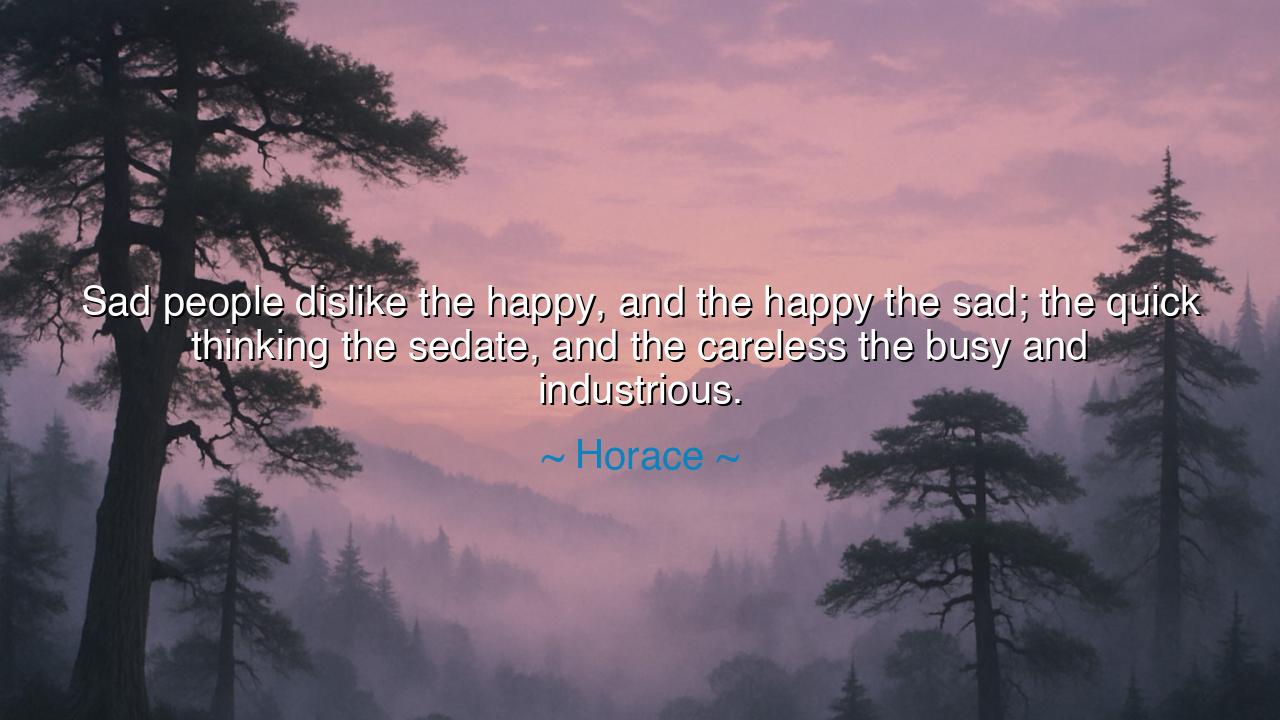
Sad people dislike the happy, and the happy the sad; the quick
Sad people dislike the happy, and the happy the sad; the quick thinking the sedate, and the careless the busy and industrious.






The Roman poet Horace, wise among his people and timeless among the thinkers of the earth, once wrote: “Sad people dislike the happy, and the happy the sad; the quick thinking the sedate, and the careless the busy and industrious.” In these words lies not merely an observation of human behavior, but a profound reflection on the discord of the human spirit. He speaks of that ancient truth—that man, rather than seeing himself in his brother, too often resents in others what he does not possess or cannot understand. For within the heart, envy and misunderstanding are twin shadows that follow even the wisest souls.
The origin of this wisdom lies in Horace’s life itself, for he lived in a world of poets and politicians, philosophers and soldiers—men divided by temperament as much as by power. He had seen joy turned to bitterness, friendship soured by difference, and minds that could not comprehend one another because they gazed through the lens of their own nature. Thus, his words became not complaint, but counsel. He teaches us that the sad resent the joyful, for happiness mocks their pain; and that the joyful avoid the sorrowful, for sorrow threatens to dim their light. Likewise, the quick of mind grow restless among those who move slowly, and the industrious scorn the careless. And so humanity, instead of harmonizing its many tones, creates dissonance—each soul retreating into the music of its own mood.
This truth is as old as time. Even in the courts of kings, the joyful and the somber have clashed. Consider the tale of King Saul and David. When David played his harp, his song lifted the hearts of men and the favor of God shone upon him. But Saul, consumed by a heavy spirit, could not bear the light that David carried. He hurled his spear not at the song, but at the joy it represented. In that act lives Horace’s truth: the sad often turn against the happy, not because the happy are unkind, but because their light exposes the shadow where sorrow hides.
Yet Horace’s insight is not an accusation—it is a mirror. It invites us to look inward and ask: Why do we reject those who are unlike ourselves? For in every person, whether quick or slow, merry or grave, there lies a fragment of the divine whole. The quick-thinking man may teach the sedate the art of swiftness, while the sedate may remind the quick of patience. The busy and industrious might learn gentleness from the careless, even as they teach diligence in return. Each temperament, each way of being, is a thread in the tapestry of the world. But when these threads refuse to weave together, the pattern frays.
Still, the wisdom of Horace is not a lament for what is lost, but a call to understanding. He asks us to rise above instinct and envy, to look upon the souls around us not as rivals but as mirrors reflecting what we lack. The happy must learn compassion for the sad, for joy is not noble unless it uplifts. The sad must find peace in the presence of joy, for light is not their enemy but their medicine. The quick must temper their speed with grace, and the slow must find dignity in their calm. Only through this mutual reverence can humanity escape the prison of its differences.
Indeed, the lesson is both humble and heroic: seek harmony, not sameness. For the universe itself is composed of opposites—night and day, sea and shore, fire and stone. Each needs the other to define its beauty. So too in human life: the strong need the gentle, the quiet need the bold, and the cheerful need the solemn. A world of only one kind of soul would be dull and incomplete. The divine plan thrives in diversity, not uniformity.
Therefore, let every seeker of wisdom take this teaching to heart: do not despise what you do not understand. When you meet one whose nature differs from your own, pause before you judge. Ask what lesson they might carry for you. In this lies the alchemy of peace—the transformation of resentment into respect, and of difference into strength.
So remember the words of Horace, that ancient poet who saw through the illusions of men. When you feel the sting of another’s temperament, do not withdraw into pride. Instead, step closer with understanding. For the one who learns to see harmony in difference shall never walk alone, and the one who learns to love the unlike shall taste a joy purer than laughter—a joy not of sameness, but of wisdom and unity, born of the heart that embraces all.






AAdministratorAdministrator
Welcome, honored guests. Please leave a comment, we will respond soon